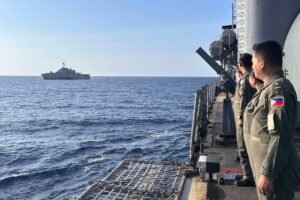The Philippine Coast Guard (PCG) has raised serious concerns about the actions of Chinese vessels near Scarborough Shoal in the South China Sea. During a recent nine-day patrol conducted by the PCG’s vessel BRP Teresa Magbanua, it was reported that four Chinese coast guard (CCG) ships engaged in persistent and potentially hazardous shadowing operations.
These actions, occurring over 40 times, involved the Chinese vessels closely following and encircling the Filipino vessel, which not only raised tensions but also posed potential safety risks in the already contested waters.
Additionally, the presence of four Chinese maritime militia vessels further increased unease and outlined the unstable nature of the situation.
Purpose of PCG’s Presence
 The presence of the Philippine Coast Guard in the area was driven by a primary objective, which is to safeguard Filipino fishermen and protect their rights in their traditional fishing grounds near Scarborough Shoal.
The presence of the Philippine Coast Guard in the area was driven by a primary objective, which is to safeguard Filipino fishermen and protect their rights in their traditional fishing grounds near Scarborough Shoal.
With Scarborough Shoal falling within the Philippines’ exclusive economic zone (EEZ), ensuring the safety and security of Filipino fishermen is of utmost importance to the Philippine government.
By conducting patrols and asserting its presence in the region, the PCG aims to uphold maritime law, warn potential harassment, and safeguard the interests of Filipino citizens engaged in legitimate fishing activities.
China’s Sovereignty Claims
 China’s claims of sovereignty over Scarborough Shoal have been a source of conflict in the region, with neighbouring countries, including the Philippines, disputing Beijing’s assertions.
China’s claims of sovereignty over Scarborough Shoal have been a source of conflict in the region, with neighbouring countries, including the Philippines, disputing Beijing’s assertions.
Despite international opposition and legal challenges, China maintains its assertion on Scarborough Shoal, considering it as an integral part of its territory.
However, these claims have been refuted by the international community, most notably by the Permanent Court of Arbitration in the Hague in 2016.
The court ruled that China’s claims had no legal basis and affirmed the Philippines’ rights over Scarborough Shoal and its surrounding waters.
China’s Response on Philippines’ Allegation
In response to the allegations made by the Philippine Coast Guard, Chinese authorities have enacted their position on Scarborough Shoal, maintaining it as sovereign Chinese territory. The Chinese Foreign Ministry defended the actions of its coastguard vessels in the area, stating that they were in accordance with international law.
Additionally, China urged the Philippines to respect its territorial sovereignty and maritime rights, emphasizing its commitment to defending its interests in the South China Sea. Despite diplomatic tensions and territorial disputes, China remains determined in its position on Scarborough Shoal, further complicating the already complex maritime landscape in the region.
The recent incidents near Scarborough Shoal outline the ongoing tensions and complex dynamics at play in the South China Sea. The allegations made by the Philippine Coast Guard against Chinese vessels highlight the challenges faced by countries in the region as they navigate territorial disputes and assert their maritime rights.
These incidents serve as a reminder of the need for continued dialogue, diplomacy, and adherence to international law to address maritime tensions and prevent potential escalations.
The presence of the Philippine Coast Guard in the area demonstrates the country’s commitment to upholding its sovereignty and protecting the rights of its citizens, particularly Filipino fishermen who rely on the waters near Scarborough Shoal for their livelihoods.
 By conducting patrols and asserting its presence, the PCG aims to safeguard maritime security and promote stability in the region.
By conducting patrols and asserting its presence, the PCG aims to safeguard maritime security and promote stability in the region.
As the situation in the South China Sea continues to evolve, it is necessary for all stakeholders to exercise control, engage in constructive dialogue, and seek peaceful resolutions to maritime disputes.
The international community plays an important role in supporting efforts to uphold the rule of law, ensure freedom of navigation, and promote stability and prosperity in the region.
Moving forward, it is essential for countries bordering the South China Sea to work together to build trust, enhance cooperation, and promote a conducive environment for peaceful coexistence. By prioritizing diplomacy and multilateral engagement, countries can address differences, manage tensions, and promote mutual understanding and respect.
Ultimately, achieving lasting peace and stability in the South China Sea requires a collective commitment to dialogue, cooperation, and the peaceful resolution of disputes. While challenges prevail, there remains hope for a future where all countries in the region can peacefully share and enjoy the benefits of this vital maritime domain.
ALSO READ: Uncovering 5 myths of Chinese New Year











Comments 3